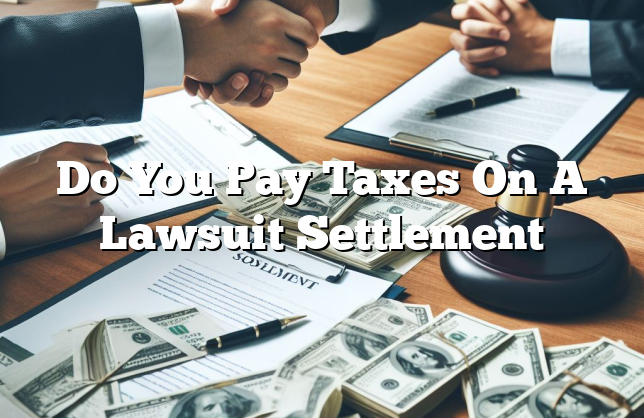Receiving a lawsuit settlement can feel like a victory, bringing compensation for past wrongs and potentially securing your future. However, amidst the relief, a crucial question emerges: do you owe taxes on this windfall? The answer, unfortunately, isn’t a simple yes or no. It’s a labyrinthine journey through the complexities of tax law, where the type of lawsuit, the nature of damages awarded, and even the wording of the settlement agreement all play a role.
Breaking Down on Do You Pay Taxes On A Lawsuit Settlement
General Rule: Income is Taxable, Unless Excluded
As a guiding principle, remember the IRS mantra: all income, from whatever source derived, is taxable unless specifically excluded by the tax code. This applies to lawsuit settlements as well. However, specific exceptions exist for certain types of damages, making some settlements completely or partially tax-free.
Navigating the Exceptions: When Taxes Don’t Apply
The primary exemption concerns compensatory damages for physical injuries and emotional distress. If your lawsuit stemmed from a car accident, medical malpractice, or any other incident causing physical harm, the compensation for your pain and suffering is generally non-taxable. This includes emotional distress directly resulting from the physical injury.
Potential Tax Traps: Punitive Damages and Beyond
However, the waters get murkier when other types of damages come into play:
- Punitive damages, awarded to punish the wrongdoer’s conduct, are typically taxable income.
- Lost wages are usually treated as ordinary income and taxed accordingly.
- Interest earned on the settlement is also taxable income.
- Business-related settlements may have different tax implications depending on the specific nature of the lawsuit.
Unraveling the Mix: Separating Taxable and Non-Taxable Portions
Often, a single settlement award encompasses various types of damages. In such cases, the key lies in separating the taxable and non-taxable portions. A skilled tax professional can analyze the settlement agreement and determine the appropriate tax treatment for each component.
Seeking Guidance: Essential Steps for Navigating the Tax Maze
To navigate this complex terrain, consider these crucial steps:
- Consult a tax professional: Their expertise can ensure proper interpretation of your settlement and accurate calculation of your tax liability.
- Review the settlement agreement: Scrutinize the wording to understand how the damages are categorized and allocated.
- Gather relevant documents: Keep copies of the settlement agreement, medical records (for personal injury cases), and any other documentation supporting your claim for non-taxable damages.
- Prepare for potential tax implications: Set aside funds to cover potential tax liabilities on the taxable portion of the settlement.
Remember, this article is not a substitute for professional tax advice. Every situation is unique, and the complexities of tax law demand the personalized guidance of a qualified tax professional. They can help you navigate the intricacies of your specific lawsuit settlement and ensure you comply with all tax regulations.
By understanding the underlying principles and seeking expert guidance, you can transform this financial milestone into a secure stepping stone for your future, free from unwanted tax surprises.


